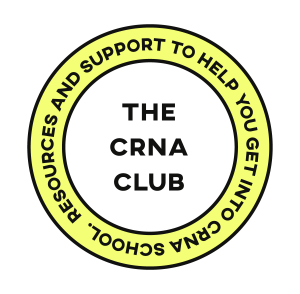Certified Registered Nurse Anesthetists (CRNAs) are Advanced Practice Registered Nurses who provide anesthetic care and pain management services in a variety of settings from surgical centers to dental offices to pain management clinics. CRNAs are highly educated medical professionals who carry a ton of responsibility, and for that reason they don’t just need incredible clinical skills, but they need solid, outstanding personal characteristics as well. There is a lot that can go wrong when caring for patients before, during, and after surgical procedures. In this post, we’re going to break down the top 8 characteristics that makes someone a successful anesthetic provider and member of the surgical team.
By the way, are you curious how competitive of a CRNA school applicant you are?
Take the free quiz here!
8 Top CRNA Skills and Characteristics
1. Collaboration
First up on the list is collaboration. Despite many people thinking that CRNAs just sit behind the surgical drape in solitude and “do their own thing,” CRNAs play a massive role in keeping every single person on the perioperative team on the same train (or Diprivan) moving forward. Do/Did you want to go into anesthesia so you don’t have to talk to people? (#spoileralert) You still have to talk to people. Yep, sorry. And it’s kind of a lot of people. The preoperative nurse, blood bank, the OR nurse, the scrub tech, the OR tech, the PACU nurse, the PACU tech, the surgeon, the resident, the pharmacist, the floor nurse, the ICU nurse, transport, and the list goes on. Don’t get me wrong, the moments do exist when you can sit pretty in silence, and listen to the sweet, sweet sound of that rhythmic 100% pulse ox beeping (truly, the sound of perfection if there ever was one). But more often than not, those moments get interrupted because somethin’s fishy and you decide you have to break your silence cuz you know, patient safety and all that.
“Doc, my patient’s HR is in the 30’s, let’s desufflate, give me a second to fix this, then we can try again”
“ I see the antibiotic bag is empty, just calling to check if that was the preop antibiotic? Or just something old from before? Just checking so I don’t double dose.
“I really need that FFP, how much longer on that?” (Blood bank huffs and snarkily replies - I SAID I’d call you when it was ready” IYKYK)
“How much irrigation have you guys used? None? Is the blood loss really 490? Or did we just forget to zero the machine”
My point is, when the anesthesia provider has something to say, it’s because it’s worth saying. And with that privilege, comes the necessity to collaborate to solve the problem, come up with an innovative solution, and move toward a common goal of keeping the patient safe, and getting the surgery done. And another thing, the question is not only “do you collaborate,” but HOW you collaborate? Barking orders, snappy responses? Not cool. CRNA’s know how to regulate their emotions and can articulate their thoughts and ideas clearly (no Karens here). And the cherry on top? They do it with respect.
2. Evidenced-based
CRNAs make decisions that are evidence-based. Oooooohhh science. We sure do love it. We love it so much that we’re constantly science-ing, which means, things are constantly changing, evolving and we’re improving patient outcomes. And by “science-ing,” I mean that CRNAs integrate scientific evidence with their personal experiences, to provide the best patient care. Now, all new CRNAs are graduating with Doctorate degrees, meaning they are even more equipped with the tools to contribute to the profession by conducting evidence-based research. CRNAs are curious people, and with that intellectual curiosity, we’re continuously evaluating and analyzing scientific evidence which improves our decision making abilities day by day.
3. Situationally Aware
CRNAs are situationally aware, and this comes with the many years of experience that CRNAs are required to have. CRNAs first have bachelor of science in nursing degrees, then they have years of ICU experience, and to top it off, complete a Doctorate program. Throughout this journey, CRNAs are exposed to many unique, critical patient situations that make them able to quickly identify roadblocks and scenarios that could quickly turn south, because chances are, they’ve been in a similar situation before.
For example, when a CRNA pulls back the curtain in the preop area, and sees their patient with a short chin, prominent teeth, and a large tongue, they know that even though this patient’s BMI is 20, this smells like trouble. They know this because they’ve been in a similar situation before. They have the experience to take a pause, and think about how they are going to approach putting this patient to sleep. They, my friends, are situationally aware.
Their next patient has an EF of 15%. Even though the patient is “just” having a colonoscopy, they know that things could quickly go south because of the patient’s fragile cardiac state. Should they have to convert to general anesthesia, it could be potentially disastrous, and they understand this making them situationally aware.
4. Adaptive
CRNAs are adaptable, we are masters at pivoting and we zig when others zag. We can ebb and flow with the situation because we are prepared for the worst of the worst. We’re trained to know what to do when all else fails. For that reason, we can adapt to ever-changing situations, and make decisions based on the scenario at hand.
They’re putting in the final stitch, and the patient is about to slowly open their eyes and gracefully wake up, but then pathology calls and says one of the specimens came back positive for cancer cells and now the surgeon says she has to go back in and take more. No problem, we got this, we deepen the anesthetic and deeper into dreamland we go.
The sick ICU patient needs an endoscopy and is too critical to be transported to the GI suite, so we go to him and provide anesthesia outside of our typically comfy GI suite (let’s be real, not many GI suites would be considered “comfy” but most people would prefer to be in their natural habitat) but we adapt.
You give a break to a coworker and of course your tidal volumes drop as suddenly the LMA isn’t sitting well. You finagle without success, and decide to go ahead and put a tube in. You adapt.
I think of course the biggest proof of CRNAs being adaptable is their life saving role in the Covid-19 pandemic. We adapted to care for the sickest of the sick and did so with major PPE shortages and ever-changing roles.
5. Clear Communicator
CRNAs have strong communication skills. There is a lot, I mean a LOT of action in the operating room. Theres beeps and boops, suction and bovies, yelling for sutures and “table up,” “table down”. More often than not there’s obnoxiously loud 80’s music on, and on top of that, the surgeon is usually shouting at the resident, “Who sings this song?” and then because the resident was born in 1992, and doesn’t know, the surgeon starts to yell even louder about what shame it is that nobody knows good music anymore.
I digress.
My point is that operating rooms can have a lot going on at once. When they need to, CRNAs speak up, take control and let the entire team know what’s going on at the head of the bed. They speak with clarity, confidence, and direct the team to take actionable steps to assist with the situation at hand.
“Hey guys, my BP’s down and patient’s tachy, we bleeding? Let’s convert to a type and cross, I’m going to start another IV, let’s untuck the arm real quick”.
“The patient’s sliding, we need to flatten out the bed and reposition since we’ve got a few more hours to go, let’s call for moving help”.
6. Receptive
CRNAs are receptive. We know there is more than one way to skin a cat. Don’t knock it till you rock it right? We each have our nuances, and ways we prefer to do things. But what marks a great CRNA is their ability to hear someone out, take their feedback, analyze it, and consider making a change in their practice. CRNAs are lifelong learners, and because of that we have to be receptive to trying new things, and improving our practices.
7. Decisive
I think any CRNA will tell you that the more experience you have, the quicker you make decisions. They may not always be the right one, but you make a choice based on what’s in front of you, and you take responsibility for that choice. You don’t always have time to oscillate back and forth, make a 12 point “pro” and “con” list. You choose and go.
8. Flexible
In line with adaptability is flexibility. CRNAs work in a variety of settings, with a variety of patient populations, and a ton of different personality types. All these things make them super flexible. When it comes to thinking outside the box, CRNAs are flexibility masters:
Sure, we don’t normally do it that way, but if it works best for the patient, we can definitely try it.
You don’t have staff to recover the patient? Ok, I’ll stick around for a few more minutes till he wakes up.
The patient is requesting no narcotic for the procedure? Ok no problem, we can do that!
Now, I’m not saying be a pushover, or be a people pleaser. Most definitely not. But what I am saying, is that it’s ok to try something new or do something a little differently. Give it a go, and if it doesn’t work out, now you know you’ll never do that again! Being flexible is a skill we can all take time to embrace.
Overall, these are the eight characteristics that I consider to be the top qualities we must all strive to possess as CRNAs (and aspiring CRNAs). Working together with the perisurgical team requires emotional intelligence and superb interpersonal skills. If you’ve got even half of these on the list, you’re off to a great start!
Watch our free 30 minute masterclass where we teach you things to avoid, what boxes to check, and how to become a stand out applicant!


